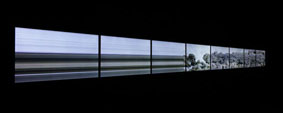

Toposcan / Ireland © Kioku Keizo,
NTT InterCommunication Center [ICC]
As the title suggests, Toposcan incorporates the process of scanning scenes from a set location to question the meaning of vision and time.
The images on each monitor are fragments that together make up one long horizontal landscape picture. Within that picture, a video image the size of one monitor slowly moves from one end to the other and back as if passing through the row of monitors. While the image moves forward, a section the size of 1 pixel at its head is gradually stretched into colored horizontal lines that seem to be coming out of the adjoining picture fragment. At the same time, as the image moves forward, 1 pixel-sized rows at the very end of it are fixed one after another to complete a still image as soon as the image has reached one end of the display, resulting in what may be seen as a trace visualizing the time of the camera's locomotion.
The work thus combines three different visual formats - colored horizontal lines that ultimately form landscape pictures; traveling footage of landscapes; and still images that appear as a result of the footage's locomotion - to present a visual experience different from the methods of spatial recognition of the human sense of vision, and of the camera as an optical device for grasping space based on it.
When trying to grasp a space by the methods of scanners or copy machines that translate two-dimensional objects into lines, for example, the result is an image without depth and vanishing point, quite different from a pictorial view based on linear perspective. This is at once a capture of the world by means other than the human eye.
Conception: Shiro Takatani
Programming: Ken Furudate
